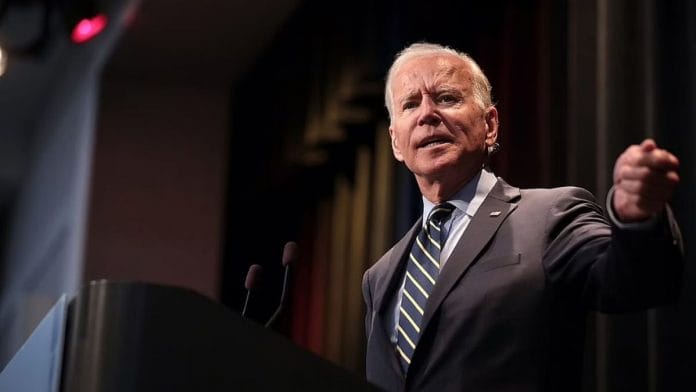US President Joe Biden’s recent speech calling Pakistan “one of the most dangerous nations in the world” has not gone down well with the South Asian country. Pakistan PM Shehbaz Sharif refuted the claims, calling the speech “factually incorrect and misleading,” reported Dawn
At a private Democratic Congressional Campaign Committee reception in California on 13 October, Biden questioned the nation’s nuclear safety protocols. Talking of “the changing world” where “most countries are rethinking alliances” and China is trying to figure out its position with Russia, India and Pakistan, he added: “What I think is maybe one of the most dangerous nations in the world: Pakistan. Nuclear weapons without any cohesion.”
Soon after the White House published a transcript of the speech, Pakistan finance minister Bilawal Bhutto Zardari addressed a press conference in Karachi, stating that the US Ambassador to Pakistan, Donald Blome, had been summoned for an official demarche. Zardari said he was surprised by the comment and believed such “misunderstandings are created by a lack of engagement.” Pakistan’s nuclear assets “meet each and every international standard in accordance with the IAEA [International Atomic Energy Agency] as far as security and safety is concerned,” he added.
‘Most responsible nuclear State’
Zardari continued retaliating against Biden’s comments by throwing light on his country’s nuclear policy: “Pakistan has also consistently demonstrated responsible stewardship of its nuclear-weapons capability, marked by a very strong commitment to global standards.”
A detailed press release from the prime minister’s office in Islamabad also expressed Pakistan’s concern against such remarks and called out ‘real threats’ to world peace. “Ultra-nationalism, violation of human rights in regions that are struggling against illegal occupation, violation of global norms by some states, repeated nuclear security incidents, arms race among leading nuclear weapon states and introduction of new security constructs that disturb the regional balance” were the real dangers to international peace and security, it said.
Noting that the US and Pakistan have enjoyed a “friendly and mutually beneficial relationship” for many years, the press release stressed the “critical importance of genuine and durable efforts to recognise the real potential of Pakistan-US relationship” in light of the world’s current enormous challenges, wrote The Express Tribune.
“Pakistan is unquestionably a responsible nuclear state,” PM Sharif tweeted, adding that the country treated nuclear safety with the “utmost seriousness.”
India, too, was not excluded from this debate. Zardari rather emphatically stood by his country’s nuclear protocols and asked Biden to direct questions of nuclear safety to neighbouring India, which had recently misfired a missile into Pakistani territory.
Acting foreign secretary Jauhar Saleem reportedly met with US Ambassador Donald Blome later that day to issue a “strong demarche” in response to Biden’s remarks, as reported in a press release from the foreign office.
Defence minister Khawaja Muhammad Asif also responded strongly to Biden’s remarks, calling Pakistan’s record as a responsible nuclear power “unimpeachable.” “We have also historically provided military assistance to the very armed forces whose commander in chief erroneously questions our ‘cohesion’,” he added.
Also read: Pakistanis stand by minister Marriyum Aurangzeb after London hecklers call her ‘thief’
Imran Khan’s fault?
While emphasising that Biden’s comment did not have “unfavourable effects on relations between Pakistan and the United States,” Zardari attacked the erstwhile Pakistan Tehreek-e-Insaf (PTI) government. He said that former PM Imran Khan had previously made “irresponsible statements” about the country’s nuclear arsenal when he publicly stated that dropping an atomic bomb on Pakistan was preferable to his removal as prime minister.
On the other hand, Khan tweeted that Pakistan had “one of the most secure nuclear command and control” and questioned Biden over his “unwarranted conclusion about [Pakistan’s] nuclear capability.”
Zardari then emphasised that Biden’s statement had nothing to do with Pakistan. “I don’t think this was an official function…it wasn’t an address to the parliament or an interview.”
The Pakistani minister also mentioned that he had recently visited Washington D.C., where he met many people and attended several important events. No one there had expressed any concerns over Pakistan’s nuclear programme.
According to Zardari, Pakistan is on a “journey of engagement” and has recently celebrated the 75th anniversary of its bilateral engagements with the United States.
Meanwhile, he warned against “going into conspiracy theories” as a nation, adding that there are a lot of “opportunities for Pakistan to positively engage with the rest of the world.”
(Edited by Zoya Bhatti)






